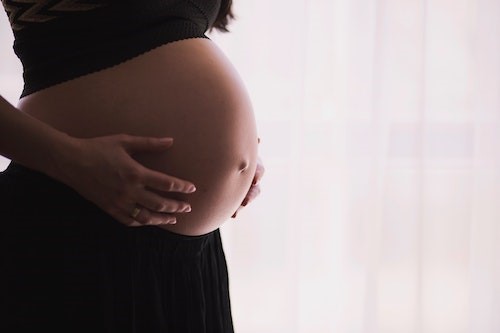Advice for women who are pregnant during lockdown
By Dr Ellie Rayner
Congratulations on your pregnancy and for coping so well during this difficult time. As a practicing Obstetrician working with the NHS, I completely understand how challenging this time has been for expectant parents.
The Coronavirus pandemic and lockdown has changed many of the ways we approach work and life and sadly pregnancy is no different. If you are currently pregnant with your first baby then chances are this is nothing like you imagined and similarly, if you have had a baby before then I am sure this feels extremely different to your previous experiences. Be reassured that maternity services are all here to support and care for you and are still open 24/7 so if you are worried about anything then do give them a call. If you are pregnant at the minute, I have some simple advice that can help you remain safe and well whilst pregnant during lockdown.

Attend all Antenatal/Postnatal appointments
Antenatal and postnatal care is still vitally important for you and your baby and your local hospital unit will have made provisions to ensure they can still provide all of the appointments you need. They will have put extra precautions in place to ensure they keep both you and your baby safe, as well as the staff working within the maternity unit. These appointments may be in a different place, or via a different method, such as video or telephone call appointment, but they are all necessary and something to look forward to. If you are worried that you have symptoms of Covid-19, or that you have been in contact with someone that does, then call your maternity unit and discuss this and make a plan with them for your appointment. This may include attending a different area or rearranging for a different day.
The same applies if you have any concerns over yours or your baby’s wellbeing in between your appointments. The NHS is working hard to ensure that maternity services are running and have safeguards in place to make sure you can access the care that you need when you need it. Even if you are symptomatic of coronavirus, self-isolating or shielding, please do not hesitate to call your local maternity unit if you have symptoms such as pain, bleeding, suspect your waters have broken or not feeling your baby move as much as normal. Whatever you concern your maternity unit will be happy to advise and see you when needed.
Keep Mobile and Active
During pregnancy you are at greater risk of developing a blood clot than a non-pregnant person and your midwife or obstetrician may have mentioned this to you already. If you are spending more time at home, or less active than usual then it is important to keep well hydrated and mobile to reduce your risk. Many women worry that exercising in pregnancy isn’t safe. This is a complete myth and undertaking regular exercise during pregnancy is important for both yours and your baby’s wellbeing and can actually help reduce your risk of complications. Exercise can give you more energy, improve your mood and sleep and can help reduce your risk of developing raised blood pressure or pregnancy diabetes (gestational diabetes). It also helps you cope with labour and can make labour shorter and easier. If you didn’t exercise very much before pregnancy, you can still start now with 15 minutes 3-4 times a week and increase as you feel able. If you previously undertook aerobics classes these are also safe to continue at home, along with walking, jogging, or pregnancy yoga.
Maintain a healthy diet and take pregnancy supplements
This can be particularly hard to do when you’re are pregnant and feeling sick or tired but if you can, try and eat a range of healthy foods. It is a common myth that you need to ‘eat for two’ when you are pregnant but actually you don’t need to consume any more calories than usual for the majority of your pregnancy and only around 200 calories more every day in the last few months.
It is particularly important that you take Folic Acid in the first 12 weeks of pregnancy to have the maximum protection for your baby against neural tube defects. Most women need 400mcg daily, however, some women do need a higher dose, for example if they have epilepsy, so speak to your GP and get a prescription for the higher dose if needed.
Vitamin D is also important for pregnant and breastfeeding women and you should consider taking a supplement for this. Vitamin D is made when our skin is exposed to sunlight and normally, we recommend taking 10 micrograms of Vitamin D every day during the autumn and winter months when we spend more time indoors or with our skin covered up. In light of the pandemic, and ongoing lockdown restrictions, we would encourage you to start taking this and continue throughout your pregnancy. Taking a Vitamin D supplement is particularly important if you cover your skin for cultural reasons or have dark skin (such as women who are of African, African Caribbean or south Asian origin) or if you have a BMI (body mass index) >30, as you can be at greater risk of Vitamin D deficiency.
Get your flu jab
The flu vaccine is completely safe throughout pregnancy and your GP, midwife or Obstetrician can arrange this for you free of charge for all pregnant women. Unfortunately, pregnancy can alter the way our bodies handle viral infections, making a small number of women more susceptible to more severe infection. Both the Royal College of Obstetricians and Gynaecologists and the Royal College of Midwives strongly recommend the flu vaccine to all pregnant women, particularly in light of the COVID-19 pandemic, as it is possible to get infected with both infections at the same time and this could cause a more serious illness.
Keep in touch with your support network
Pregnancy is a really exciting time for you and your family and even if you are not able to share your journey face-to-face or in person, try and find different ways of keeping in touch and including them. With lockdown restrictions you may be feeling more anxious at the moment and equally, your friends and family may be worried about you too. Try and stay in regular contact with anyone that can provide you with emotional support during pregnancy and be honest and open about your feelings with them and to your midwife or doctor. They will ask about your mood and feelings at every appointment and can make sure you get any additional support you need.
If you do need any further information about current recommendations and advice regarding pregnancy and Covid-19, please see the Royal College of Obstetricians and Gynaecologists website or speak to your local maternity unit as they will able to advise you on update to date guidance for you area.
Stay safe and stay well.
-----------------------
About the author
Dr Ellie Rayner is an Obstetrician and Gynaecologist, Antenatal and Hypnobirthing teacher and founder of The Maternity Collective
